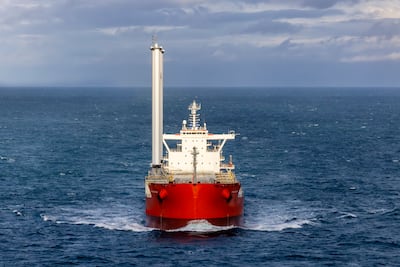A sail-powered cargo ship has returned from a six-month global journey and saved up to 15 per cent on fuel by utilising innovative green technology.
The bulk carrier Pyxis Ocean, left its port in Singapore in August 2023 and crossed the Cape of Good Hope on its way to Brazil, before eventually docking in Amsterdam last week.
Over the six-month period since its first journey, the boat glided through the Indian Ocean, Pacific Ocean, North and South Atlantic using two foldable sails.
Scientists say the ship's ability to harness the wind has allowed it to significantly reduce carbon emissions during its travels.
The freighter, which was charted by food giant Cargill, was assisted by two innovative steel and fibreglass vertical sails – known as WindWings – which reach 37.5 metres in height and resemble aircraft wings.
Scientists who studied the vessel's performance say its wind-propulsion technology allowed it to save three tonnes of fuel a day.
This resulted in an effective 15 per cent reduction of diesel fuel that it would be typically expended, according to Cargill.
The data “underscores the potential” of wind to reduce the shipping industry's carbon footprint, the company says.
Using sails can potentially have an even bigger impact when installed on vessels that can also run on low-carbon marine fuels, like green methanol, according to Jan Dieleman, president of Cargill’s ocean transportation business.
“Technologies that harness the wind could be an important, cost-effective way to achieve our decarbonisation goals in the short, medium and long term,” he said.

The retractable sails, which were designed UK-based Bar Technologies, are fully automated and measure the wind and self-adjust to the optimal configuration.
Bar says it is now looking to showcase its technology on newbuild vessels and says other ships are likely to use two wings, instead of three.
Cargill is involved with five large ships that are on order and can run on green methanol, and is “actively looking” at having some kind of wind-assisted propulsion installed, Mr Dieleman said.
He cautioned that wind does have limits, partly as it doesn’t work for all trade routes.
Large cargo vessels carry about 80 per cent of world trade and are primarily powered by crude oil, creating about 1 billion tonnes of CO2 each year.
Sails are unlikely to be widely adopted across all classes of shipping and for all fuel types in the near term, limiting the environmental benefits the technology offers.
It is more likely to be taken up for those burning more expensive fuels where the cost savings are greatest.

